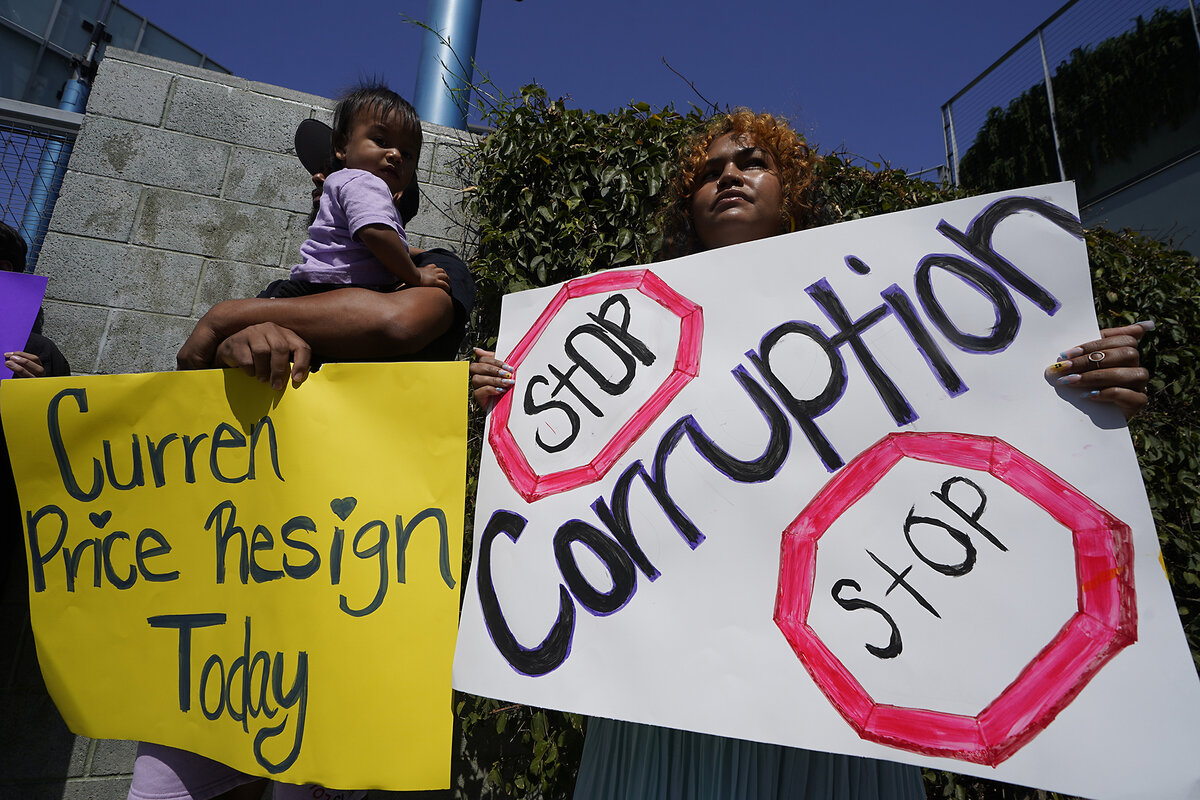High-profile scandals lead to high-profile local reforms in California
Loading...
| Los Angeles
When Ben Flores went to the polls in Los Angeles last month, it wasn’t the presidential election that had him fired up. He was drawn by a city charter amendment that would create an independent commission for determining new city council districts.
The 27-year-old freelance copy editor is among millions of Californians who responded to years of high-profile ethics scandals here by ushering in policies promising greater transparency and accountability – and turning out some officials tainted with suspicion.
Why We Wrote This
A story focused onFed up with high-profile scandals, California voters chose greater transparency and accountability in local elections.
A crescendo of mistrust at the local level made the moment ripe for ethics reforms throughout the Golden State, and especially in LA, where a slate of measures will overhaul local government. And across the United States, the mood was apparent: Lawmakers in 34 states introduced 146 ethics bills to state legislatures.
“In general, there’s a feeling that politics is a game for moneyed interest and politics is about pay to play,” says Jessica Levinson, director of Loyola Law School’s Public Service Institute. Add to that these examples of “politicians behaving badly, and you have a perfect ingredient for voters to be in a reform state of mind.”
When Ben Flores went to the polls in Los Angeles last month, it wasn’t the presidential election that had him fired up. He was drawn by a city charter amendment that would create an independent commission for determining new city council districts.
“It just doesn’t make sense that the people who are making policy are also the ones who are, like, establishing their own districts,” says the 27-year-old copy editor. “I think independent redistricting like that makes a lot of sense.”
Mr. Flores is among millions of Californians who responded to years of ethics scandals in the state by ushering in policies promising greater transparency and accountability – and turning out some officials tainted with suspicion.
Why We Wrote This
A story focused onFed up with high-profile scandals, California voters chose greater transparency and accountability in local elections.
Polls show Americans overwhelmingly believe large donors have too much influence on government – although a majority voted for a president with well-documented ethics breaches. But a crescendo of mistrust at the local level made the moment ripe for ethics reforms throughout the Golden State, and especially in Los Angeles, where a slate of measures will overhaul local government.
“In general, there’s a feeling that politics is a game for moneyed interest and politics is about pay to play,” says Jessica Levinson, director of Loyola Law School’s Public Service Institute. Add to that these examples of “politicians behaving badly, and you have a perfect ingredient for voters to be in a reform state of mind.”
Grabbing “ahold of the wheel”
California has had a run of recent high-profile scandals. In the Bay Area, voters recalled two top officials caught up in ethics probes: Oakland Mayor Sheng Thao and Alameda County District Attorney Pamela Price. Both were swept up in an FBI investigation of influence-peddling. The cloud of scandal added to deep frustrations with their progressive policies on crime.
In October, Orange County supervisor Andrew Do pleaded guilty to a bribery charge in connection with funneling millions of county dollars to a nonprofit run by his 20-something daughter.
At the beginning of the year, former LA City Councilmember José Huizar pleaded guilty to racketeering and tax evasion in what the FBI called “the most audacious public corruption case” in LA’s history.
In June the city Ethics Commission accused Councilmember John Lee of misusing his position, and the district attorney charged Councilmember Curren Price with embezzlement, perjury, and conflict of interest.
All of this is while the 2022 recorded conversations of LA councilmembers making racist remarks and discussing breaking up districts that represent largely Black communities are still fresh on voters’ minds. Two of the three recorded councilmembers lost reelection bids, and the other resigned.
In addition to a new independent commission for redistricting – a direct response to the recordings – LA voters last month also backed a requirement that city contractors disclose conflicts of interest, and approved autonomy and funding for the city’s existing Ethics Commission.
San Diego passed a similar measure to strengthen its Ethics Commission, and San Francisco voters approved a new inspector general in the county controller’s office to investigate fraud, waste, and abuse, and to issue subpoenas.
The most dramatic change will happen in LA County, where voters said yes to a new elected position to oversee the most populous county in the United States: county mayor. The same measure also takes the number of county supervisors from five to nine.
“If this works, what it basically proved is that the people can revamp their form of government,” says Raphael Sonenshein, executive director of the Haynes Foundation, which supports governance and democracy in Greater Los Angeles.
At the federal level, those changes are near impossible, he says. “But when you look at our local governments all across the country, that’s where every once in a while, often because of a crisis, people just grab ahold of the wheel as voters and basically say, ‘We’re going to make a change.’”
But those changes come with trade-offs, says Professor Levinson, a past president of LA’s Ethics Commission. The new county mayor, for instance, will be accountable to voters – but will be beholden to the campaign cycles of fundraising.
“That person is going to have to raise a lot of money. And where does that come from?” she asks. “It typically comes from people who have something to gain or lose from county government.” Voters, she adds, will be choosing the best campaigner.
Historic changes
This year alone, lawmakers in 34 states introduced 146 ethics bills to state legislatures. Twenty-nine of those, in 17 states, have been enacted.
The passage of Measure G, and the overhaul of LA County government, is historic, says Dr. Sonenshein. The elected mayor will replace an appointed county executive. And the county board of supervisors will nearly double – the first increase since it was established in 1852, when the county had 3,500 residents. Today it is close to 10 million.
Implementation is years away, along with a fuller realization of how these changes will impact policymakers and the communities they serve.
“This might allow a greater sense of what works and what doesn’t,” says Dr. Sonenshein, adding that the county mayor will offer residents a clear point person for their needs and frustrations. “And then when something does blow up, knowing where to go with how you feel about that is a big step forward. ... That’s how change happens.”









